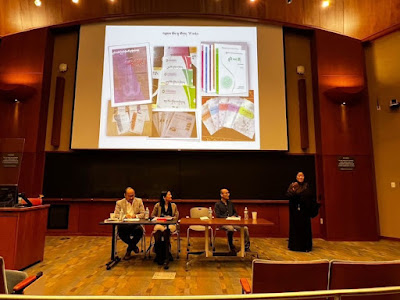Professor Tsering Wangmo Dhompa recently participated a Tibetan Women Writing Symposium at the University of Virginia, held April 8-10. English masters student, Theo Campbell, interviewed her to learn more about this important event.
TWD: There are very few occasions when I hear Tibetan being spoken in public spaces, so my heart was dancing listening to poetry read in the many Tibetan dialects. The event was planned in 2019 by professors and scholars of Tibetan Studies and Buddhist Studies from France, England, and the U.S. The goal was to bring together Tibetan women writers from inside Tibet and in the diaspora and international scholars to have conversations about Tibetan literature. It seemed like an impossible gathering with multiple postponements due to COVID, and visa restrictions for writers traveling from Tibet and India. One writer arrived a few hours before her reading so there was a lot to celebrate at this unprecedented event celebrating Tibetan women’s literature.
Theo Campbell: Why do you think it’s important to have events like this that bring together writers from a particular culture?
TWD: This was an extraordinary event for multiple reasons. If I’d have to pick three reasons, I’d say first, that Tibetan writers in the diaspora are often denied entry into Tibet, and it’s difficult for Tibetan writers from Tibet to leave Tibet so a face-to-face meeting between us is near impossible. Then, secular literature and the genre of fiction is a recent development in Tibetan literature, and even within this field, narratives of men and by men have held dominance so an event celebrating the writings of women is rare. Lastly, the ongoing occupation of Tibet makes the Tibetan language crucial in our collective struggle. The Tibetan language becomes something we have to fight for because it is either banned or made an optional language within the curricula in Tibet.
Literature provides a space where writers and readers can be in the same place and share their longing for a different present, and talk about what it means to be and write as Tibetans even as they write in different languages and under very different circumstances. Tenzin Dickie, Min-Nangzey, Chimay, Tsering Wangmo Dhompa, Tsedron Kyi and Kelsang Lhamo
Theo Campbell: This was an event that featured both public readings of creative works and scholarly discussion of them. What do you see as the connection between literary scholarship and creative writing, and how do these two practices work together or push against each other in your own work?
TWD: This is such a beautiful question and one that I am still trying to feel out as I write.One of the writers present at the symposium spoke about how the form of the novel or short story allows her to write about the everyday labor of women and the violence inflicted on women in a way that she cannot do so in her essays. I suppose I am circling around the same questions in both creative writing and my research. I feel I can approach them from different directions. One of the Tibetan scholars (who is also a spectacular translator) pointed out that some of my poems are filled with the cadence and feeling of the Tibetan language. He could hear Tibetan. I loved hearing that, poetry allows me to carry over sounds, images, and notes from the Tibetan language into the English. I can dream, I can put my longing for justice in a different pace and urgency from that of my research work. Dhondup Rekjong (translator); Tsering Wangmo Dhompa, Dr. Lama Jabb (translator) and Chimay
















